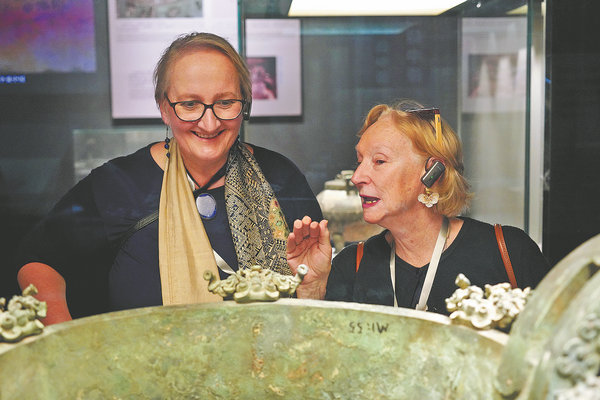
Participants of the "Exploring China" Henan Tour admire a bronze ware at Henan Museum in Zhengzhou city. XU LIN/CHINA DAILY
While several expats are admiring the intricate animal patterns on an ancient Chinese bronze object, others are carefully listening to a tour guide explain the skill and wisdom behind the craftsmanship.
It was part of the "Exploring China "Henan Tour event in Zhengzhou, Luoyang and Anyang in Central China's Henan province from Sunday to Tuesday.
More than 40 foreign experts in classical studies from 13 countries visited Henan's heritage sites, Longmen Grottoes and the Yinxu Museum, immersing themselves in the rich Chinese culture and civilization.
Two other groups joined the tours in Shandong province, visiting places like the Temple of Confucius, and in Sichuan province, traveling to key archaeological sites like Sanxingdui and Jinsha.

Experts attending the first World Conference of Classics visit Jinsha Site Museum in Chengdu, Sichuan province, on Monday. ZHANG LANG/CHINA NEWS SERVICE
These experts are participants in the World Conference of Classics, being held in Beijing from Wednesday to Friday.
"I'm excited to visit China for the first time, and I plan to travel to China again with my family, to see more of its deep culture and history," says Michael Trapp, emeritus professor of Greek literature and thought at King's College London.
Before setting out, he sought advice from his Chinese doctoral student in London and his brother, a Chinese language translator who often travels to China for work. Both suggested that given his passion for history, archaeology and art, he would find his visit to Henan particularly captivating, which he does.
At the museums, he finds that the use of modern technology has made historical sites more accessible to a modern audience, striking a delicate balance between preserving ancient materials and showing their history vividly via replicas and digital reconstructions. "This endeavor requires considerable effort and creativity," he says.
He believes that it's wonderful to see the massive size of the Erlitou Site in Luoyang and the artifacts excavated from it at the nearby museum. It shows the archaeological process of their discovery.
Thomas Michael from the United States, professor at School of Philosophy, Beijing Normal University, who does research into Chinese philosopher Lao Tzu, agrees.
"I've read about all these places, but it's the first time to see various artifacts about the origins and downfall of the Shang Dynasty (c.16th century-11th century BC) and the beginning of the Western Zhou Dynasty (c. 11th century-771 BC)," he says. "It's amazing to see the ancient centers of Chinese civilization. These are important periods for Confucianism. … The Confucian tradition goes all the way back to Zhougong (the Duke of Zhou) from the Western Zhou Dynasty."
The duke was believed to have been a prolific author with humanistic ideas and written Rites of Zhou, a fundamental ancient Chinese classic on organizational theory.
Mary Evelyn Tucker, a senior lecturer and research scholar at Yale University, says: "It's exciting to have this cultural tour to Henan and see that China is recovering its own traditional past. … China's modernization has developed very rapidly over the past 40 years since my first visit to the country in 1985."
Her research fields include Confucianism and ecology. China is moving toward ecological civilization, she says, which has greatly changed its ecology, society and spirituality.
She says that Confucianism, Taoism and Buddhism have the cultural values for an awakening of environmental consciousness, for example, the concept of "heaven and man are united as one" in Chinese philosophy.
Costas Synolakis, the Chair of Earth Sciences in the Academy of Athens, points out that "it's great to see the different periods of Chinese history and how its art evolves".
His research focuses on how people in ancient Greece and Rome understood and dealt with extreme disasters. He's surprised to find that the ancient Chinese tried to control floods about 4,000 years ago when he visited Henan's museums. "It's around the 4th and 5th centuries BC that people in the Mediterranean started to understand that floods and earthquakes are natural phenomena. … It's motivating for me to learn much more about Chinese culture, especially the recorded floods in its history."
According to him, many people associate China's history with its dynasties, but are not familiar with the country's ancient capitals in Henan and how the Chinese shifted these ancient capitals in history. That's why the trip has impressed him greatly.


